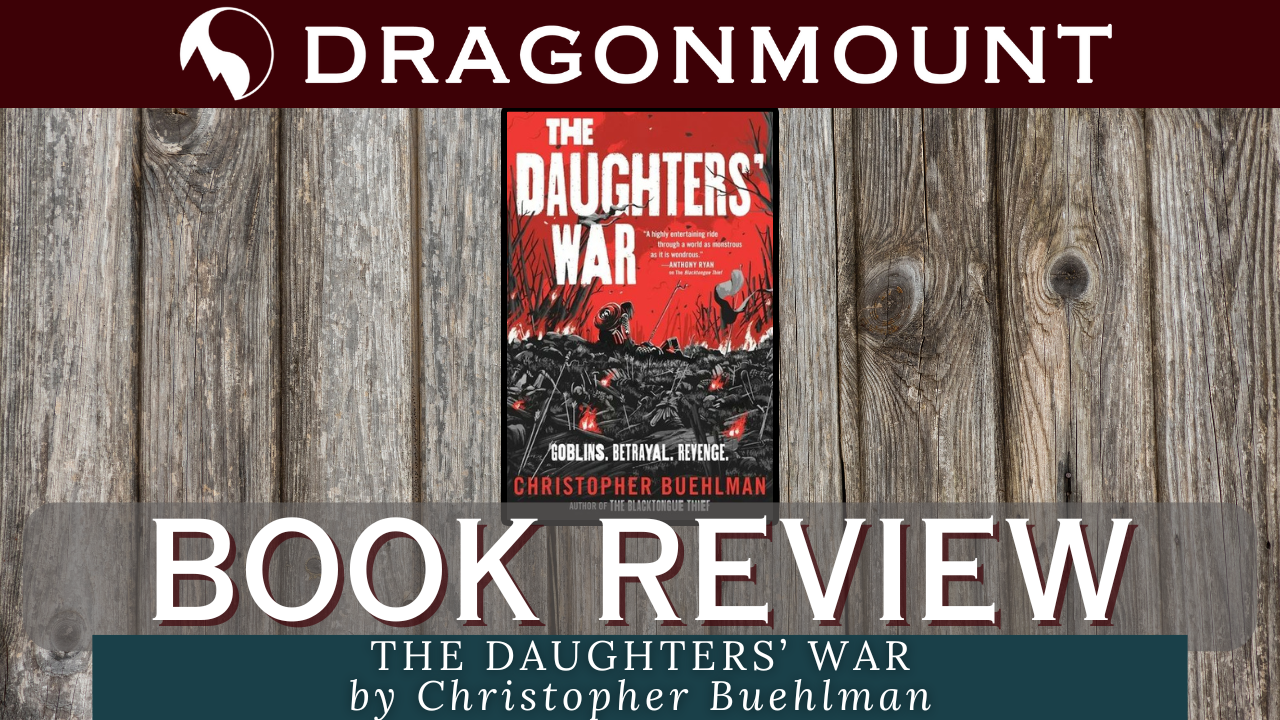
I was incredibly excited to read The Daughters’ War by Christopher Buehlman, whose work I first discovered last year when browsing for audiobooks by top rated performances. Buehlman had read his own book, The Blacktongue Thief, and I was intrigued. In theory authors should be the perfect people to narrate their own books—they will get all of the pronunciation correct, and any intended inflections or emphases will be realized—but this is seldom actually the case. Voice acting is a talent and a skill that takes training to develop, just as writing is, and most folks pursue one path or the other (well, most folks pursue neither but we’ll forget about them for now). Buehlman defies this by turning in an excellent and accented performance of The Blacktongue Thief, deftly introducing readers to the characters and lore of his grim fantasy world.
The world of “Blacktongue,” where the duology (and I hope there are more books to come) is set, was not always grim. The Blacktongue Thief takes place several years after the goblin wars, a series of invasions by goblins that required increasingly desperate measures and alliances to be repelled by the kynd (the humanlike [humankynd?] races). The first invasion, known as the Knights’ War, was easily won by knights on horseback who outmatched the shorter goblins. The goblins responded by introducing a plague that devastated the horse population nearly to extinction, and the second invasion, called the Threshers’ War, required the conscription of farmers in order to hold out against the goblins. The humans won but paid a high price in blood and sons, and when the goblins came again, they had to call upon their daughters to march to war.
This “Daughters’ War” is where this second book takes us, from the perspective of Galva dom Braga. Galva, who was a grizzled veteran who worships the god of death in The Blacktongue Thief, is now an untried soldier marching to war as part of an experimental unit of women soldiers matched with war corvids. The corvids are magically bred, oversized, intelligent ravens that are trained to kill goblins. Readers of The Blacktongue Thief will know that the war corvids did indeed turn the tide, driving the goblins to an uneasy truce and leaving nearly the entirety of Manreach with a severe case of PTSD.
The Daughters’ War takes place during the war of that name, but the book is really about one daughter’s war: Galva dom Braga. Her three brothers are also marching to war, each in different capacities, and the story follows the dynamics of the dom Braga family in tandem with the battles against the goblins. The eldest brother and heir is a drunk who has been given a mostly symbolic rank and spends his war drinking and carousing with other ignoble nobles. The next brother has earned his high rank and sits on the senior war council. The youngest brother is a sort of assistant apprentice to the powerful and slightly mad wizard who created the corvids. Then there is Galva, the third eldest, who has trained at the elite sword academy and is paired with two deadly war corvids but has not yet been tested in a real fight.
Each dom Braga sibling will be tested in this war—against the enemy, against each other, and against themselves—and some will do better than others. Galva also experiences love and friendship, all against the backdrop of a terrible war that can suddenly and painfully introduce loss into any relationship.
And the war is brutal. Readers of The Blacktongue Thief will recall the legacy that the goblin wars had on the lands and their people; readers of The Daughters’ War will experience that trauma directly. These goblins are not the lesser cousins of orcs that populate many fantasy worlds. These are terrifying monsters whose primary reason for invading is simply that they want to eat people. Being eaten by monsters is not an unusual threat in fantasy (who can forget the infamous trolloc cookpots), but there is something particularly terrifying about the matter-of-factness with which these goblins pursue it (Buehlman has also written several horror novels). People are farmed, dumbed with drugs, herded, butchered, and savored. The goblins are intelligent, but in a nonhuman way. They build siege engines and execute strategies, but they also swarm like zombies, piling over themselves to overwhelm adversaries. There is an inevitability to the goblin invasion that permeates these pages. That is why the farmers, and now the daughters, have been called to fight.
I applaud Buehlman for creating this menacing adversary, and I applaud him further for making this book about the people who are fighting more than about the fight. There are fights aplenty, but the impact is felt more on Galva's character than on the battlelines. The book is, after all, a prequel, so a prepared reader will know more or less how the war itself goes. What is far more interesting is the path that Galva takes from a green soldier to the hardened, no-nonsense soldier that we meet in The Blacktongue Thief. We also see Galva meet the Infanta Mireya, whose usurped throne is a point of some consideration in The Blacktongue Thief, but whose relationship to Galva is the point of consideration in The Daughters’ War.
Perhaps the thing that impressed me most about this book is the change in tone from The Blacktongue Thief. That book is told from the perspective of the titular thief, full of exaggerations and swagger, willing to do most anything to seize an advantage. This book, from the perspective of the upright soldier Galva—for whom lying is a cardinal offense and to whom death is preferable to dishonor—feels entirely different. Even the verbosity is dialed back, from a skilled linguist who clearly enjoys his way with words to the laconic soldier who will not waste breath nor ink on anything that does not need to be said.
The Daughters’ War is a masterpiece in evoking the readers’ full range of emotion. This book made me stay up past my bedtime, made me cry, made me laugh (a little—there is little humor in war), and a certain character made me absolutely furious. I cannot recommend this book enough, and we can all hope that Christopher Buehlman continues to write in this world. The Daughters’ War is released on June 25; thank you to Tor for the advance review copy.












Recommended Comments
There are no comments to display.
Join the conversation
You can post now and register later. If you have an account, sign in now to post with your account.
Note: Your post will require moderator approval before it will be visible.